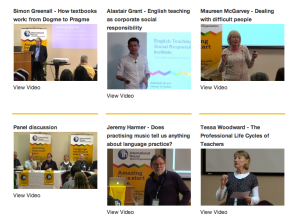Saturday May 1th 2014 saw me presenting a spanking new talk at MAC2014 – the annual Macmillan conference in Montevideo, hosted by the Anglo institute. It’s the third time I’ve talked at the Macmillan Montevideo conference and it was great to catch up with old friends and make some new ones.
The talk has been a long time in the making since it was inspired by Jeremy Harmer’s talk at the 2010 International House DoS Conference – ‘Speak the speech, I pray thee’, which discussed improving students’ fluency by helping them to think and prepare inside their heads first. It was an inspiring talk, but a little short on practical ways to get the students actually doing this in the classroom. So I set about trying to motivate and inspire my students to think much more in the class, alongside their development of the other four skills. It’s taken me a few years to put what I’ve done into a talk, since it’s very much a case of small steps and slowly, slowly catchy thinking student. As the Macmillan conference was focused on developing Life Skills, I thought this was the perfect opportunity to make myself write the talk and bring together my ideas on the topic.
The results are here, in the form of the slides for the talk in PDF:
and a video of them too:
as well as the video I used at the end as a way of having the students reflect on the ideas we discussed during the talk and think about how they could create more thinking space, structure and sensitivity into a lesson using this video. Unfortunately during the talk the sound was dodgy, so the great lyrics couldn’t be heard beyond the front row (and apologies to the audience that I had to resort to singing some of them myself!
I also hope to put a lesson together myself using this text as a launching ad, so look out for that here too!
Next up is the example text-based guided discovery lesson I used. You can read more about Guided Discovery and this lesson here if you’re interested.
And then here are some lesson ideas to use at the beginning of your efforts to inspire your students to think in English:
A reading based on a text about why to try and think in English when learning the language, with a worksheet that has built in space and structure for thinking.
Encourage your students to do some thinking for homework and then discuss what they’ve done in class – the flipped classroom turns your students flipping (if they talk to themselves 🙂 ).
Anecdote feedback sheet An example of how the students can reflect on each others’ work and tech each other a little more about anecdoting.





















The Game’s Up!
7 12 2012The Game’s Up! was my plenary session on Saturday morning at IHTOC3. The aim of the session is to review the use of games in the classroom over the last 50 years or so and discuss whether games are still relevant in the language learning classroom today.
Along the way we played a few games from the past and the present and looked forward to the future of games as well (with a little help from my private student, Sergio).
On the link you will find a recording of the session, the session slides and all of the handouts of the games used in the session – enjoy!
The next step is to create a handout for teachers to use while watching the video to make watching it a more hands-on exercise – watch this space.
What are your favourite games to play with your students? Do please share them with us. Do you stick to old faves or are you at the forefront of gaming technology use with your students. As always, I’d love to hear from you, both about the session and your ideas too. Game on!
Comments : 3 Comments »
Tags: #IHTOC3, 2012, activities, comment, CPD, ELT, Football, games, handout, IH, International House, Neil McMahon, Share, slides, Students, video, workshop
Categories : Lending Lessons, Reworking Workshops